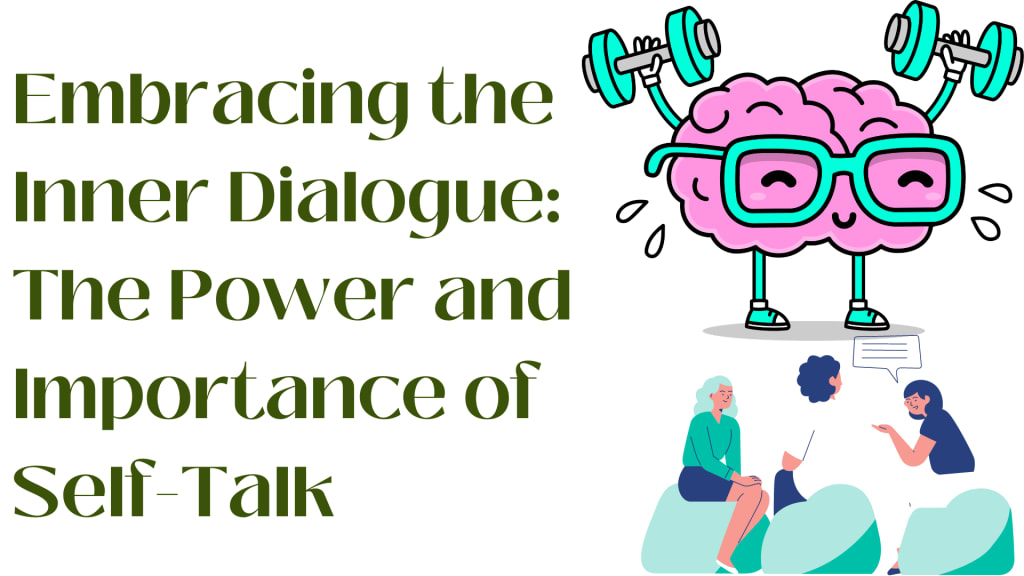Embracing The Inner Dialogue
The Power and Importance of self-talk

Have you ever found yourself talking to yourself? Maybe it's when your morning alarm is blaring and you mutter, "Why did I set it so early?" Or while brushing your teeth, you ponder, "I need a haircut... unless?" These are just a couple of instances where our inner thoughts take the form of self-talk. But what's the deal with talking to yourself? Is it normal? Does it matter what we say? Let's explore the world of self-talk and its impact on our lives.
Self-talk is the chatter inside our minds, often referred to as inner speech. It's different from just thinking about facts or remembering things. Psychologists define self-talk as verbal thoughts directed at ourselves or aspects of our lives. This can range from personal conversations like telling yourself, "I need to improve my free throw," to everyday reflections like, "The gym is too crowded today; I'll go tomorrow." While most self-talk remains silent in adults, talking out loud to ourselves also falls into this category. Interestingly, children often vocalize their self-talk while playing – a behavior that Russian psychologist Lev Vygotsky believed was crucial for their development.
As we grow older, this vocal self-talk evolves into our private inner dialogue. This inner chatter isn't just random; it serves various purposes. It helps us plan, navigate tricky situations, and even motivates us throughout the day. But studying self-talk is no easy task. It involves observing a behavior that happens spontaneously and without our conscious control. Scientists are still untangling the mysteries, like why some people self-talk more than others and what brain regions are involved.
Despite the complexities, one thing is clear: the content of our self-talk matters. Positive self-talk, which includes instructional or motivational words, can significantly impact our attitude and performance. For instance, a study involving college tennis players found that using instructional self-talk during practice enhanced their focus and accuracy. On the other hand, negative self-talk can be harmful. If we're constantly critical of ourselves or excessively negative, it can become toxic. This negativity might predict anxiety in both children and adults, and excessive self-blame and rumination can lead to heightened feelings of depression.
The concept of "distanced self-talk" is intriguing. It involves talking to yourself as if you're conversing with another person. Instead of saying, "I'm going to ace this exam," you might think, "Caleb, you're well-prepared for this test!" Research suggests that this type of self-talk is particularly helpful in reducing stress during anxiety-inducing tasks like meeting new people or public speaking.
This brings us to the realm of cognitive behavioral therapy (CBT). It's a psychological treatment that focuses on adjusting self-talk patterns. Therapists in CBT guide individuals to recognize negative thought cycles and replace them with kinder, more rational reflections. Over time, this approach can lead to improved mental health.
In a world where we're constantly engaged with ourselves, it's important to remember the impact of our inner voice. Positive self-talk can uplift our mood, boost our confidence, and aid in accomplishing tasks. Conversely, negative self-talk can drag us down and worsen our mental well-being. The next time you catch yourself engaging in self-talk, treat yourself kindly. Your inner voice is a lifelong companion that shapes your perceptions and attitudes. By nurturing a positive self-dialogue, you're taking a step towards a healthier and more fulfilling life journey.
About the Creator
Jordan G
Avid writer and reader
Enjoyed the story? Support the Creator.
Subscribe for free to receive all their stories in your feed. You could also pledge your support or give them a one-off tip, letting them know you appreciate their work.






Comments (1)
Nice read